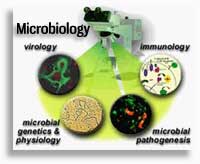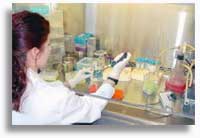MICROBIOLOGY
Introduction
Microbiology is the study of micro-organisms which means an organism which can be only seen by the microscope and usually are unicellular or cell-cluster microscopic organisms. Microbiology is a broad term which includes many branches like Bacteriology, Virology, Mycology, Parasitology and others. A person who specializes in the area of Microbiology is called as Microbiologist. Although much progress has been made in this field, according to conservative estimates not more than 1% is known about the microbes in any given environment.Thus, despite the fact that over three hundred years have passed since the discovery of microbes, the field of microbiology is not only in its infancy but also with a huge potential for growth.
It is certainly one of the fastest growing fields in terms of career-growth. Microbiology is a branch of Biology that includes the study of growth, characteristics and various other aspects related to the life cycle of micro organisms such as protozoa, algae, fungi, bacteria and viruses. In other words, it is the study of microscopic organisms. Micro-organisms are very small organisms which are not visible through naked eye. Sometimes they are even referred to as microbes as they are studied under microscope, being very small in appearance.

Nature of Work
Microbiologists are usually involved in the study and investigate micro-organisms and their relationships with man, animals and plants. Some of the sub-categories of microbiologists are as follows. Medical microbiologists are one who study the role played by micro-organisms in inflicting diseases in humans and animals. They research and investigate these organisms to find ways to cure and prevent, occurrence of these diseases. Major breakthroughs have been made in this field and efforts are on all over the world to find solutions to many more dreadful diseases especially AIDS.
AGRICULTURAL MICROBIOLOGISTS: As India is still an agricultural economy,microbiologists play an important role in mostly improving it's size and shape i.e.the output and quality. Agricultural microbiologists study plant diseases, and their role of micro-organisms in soil fertility and spoilage of farm products. Advances and inventions made in agricultural microbiology over the years has contributed in increasing agricultural output.
INDUSTRIAL MICROBIOLOGISTS: they are the ones who work with industries producing products such as alcoholic beverages, amino acids, citric acids, Vitamin C and antibiotic,s etc. with the help of micro-organisms.
MARINE MICROBIOLOGISTS: they are the ones who deal with the micro-organisms present in the ocean. It is a relatively new division of microbiology and promises to be an exciting one.
GENERAL MICROBIOLOGISTS: they mainly focuses on the fundamentals and basic features of micro-organisms including ecology, metabolism, genetics, physiology and structure.
Personality
Microbiology like any other research related science field requires very much dedication apart from having scientific and analytical temper, interest in research, observant attitude, deligence, ability to work in team of professionals, good communication skills and hardwork. Good mathematical and computational skills are of added advantage. They have been mostly responsible for the development of vaccines, antiserums against a wide variety of diseases including small pox, typhoid, whooping cough, polio, measles, etc. The study of microbiology is comprehensive in nature. Microbiologists can specialize in a variety of areas.
Courses and Eligibility
Aspirants who are interested in Microbiology can start their educational career right from undergraduate level. After passing 10+2 with Physics, Chemistry, Botany and Zoology with at least 50%, one can take admission in B.Sc Microbiology in a good institution. One having B.Sc in Biological Sciences can also apply for M.Sc. course in Microbiology/ Applied Microbiology. Again one can opt for any specialisation like Medical microbiology, Food Microbiology, Industrial Microbiology, Bioinformatics, Microbial-Technology, Clinical Research, Molecular biology, Biochemistry, Forensic Science, Hospital Management or even Hotel Administration. The M.Sc program in Microbiology is offered by many universities in India. Selection is made on the basis of merit. However, few universities conduct written entrance examination for selecting candidates.
Career Prospects

Microbiologists also have the option to become faculty members in Universities, Colleges or teachers in Schools, etc. For college teaching, a master´s degree may be acceptable along with qualification of CSIR – NET, but a doctorate opens more avenues. Teaching and research at the university level and high level employment with good promotion prospects in non-academic research institutes, private industry and government agencies usually require a Ph.D.
Self employment is also a very good option for microbiologists to start their professional career. They can set up microbiological laboratories of their own and can help in diagnosing the disease and researchers to direct their own research. There are large, private research institutes which conduct Microbiological/ epidemiological studies for Government agencies when there is a sudden outbreak of any epidemic disease. These studies focus on a wide variety of urban and metropolitan problems such as a sudden outbreak of any disease.
Institutes/Universities
Microbiology |
Remuneration
Microbiologists who are employed in govt. /private organization get lucrative remuneration along with perk and other benefits as revised time to time. In India, the professionals who are working in pharma or biotech labs can get starting salary somewhere between Rs.10, 000 – Rs.15, 000 per month. With two or three years of experience the salary gets doubled. Those who are working in govt. organizations or research labs also get handsome salary with other benefits. The salary ranges from Rs.10, 000- Rs.20, 000. The Junior Research fellows who work on various projects get monthly fellowship of Rs.12, 000. The scope for microbiologists is more in developed countries like US, UK, Australia, France and Germany. In these countries one who is engaged in research work gets around $30,000 to $70,000 per year.
